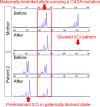A novel CASK mutation identified in siblings exhibiting developmental disorders with/without microcephaly
- PMID: 28944139
- PMCID: PMC5608927
- DOI: 10.5582/irdr.2017.01031
A novel CASK mutation identified in siblings exhibiting developmental disorders with/without microcephaly
Abstract
The calcium/calmodulin-dependent serine protein kinase gene (CASK) mutations are associated with various neurological disorders; a syndrome of intellectual disability (ID) and microcephaly with pontine and cerebellar hypoplasia (MICPCH), FG syndrome, X-linked ID with/without nystagmus, epileptic encephalopathy, and autistic spectrum disorder (ASD). Next generation sequencing was performed to elucidate genetic causes in siblings exhibiting developmental disorders, and a novel CASK mutation, c.1424G>T (p.Ser475Ile), was detected in a male patient with ID, ASD, and microcephaly. Radiological examination of his brain showed no structural abnormality. The identified mutation was shared with the healthy mother and a younger sister exhibiting ASD. Although the mother showed a skewed X-chromosome inactivation (XCI) pattern, the sister showed a paradoxical XCI pattern. This would explain why this sister possessed a normal intellectual level, but showed the same ASD symptoms as the affected brother. A novel CASK mutation was identified in two siblings with ID and/or ASD, suggesting a relationship between the CASK mutation and ASD. Recently performed large molecular cohorts for patients with developmental disorders suggest that CASK is one of the genes related to developmental disorders. For better understanding of genotype-phenotype correlation in ASD cases with CASK mutations, more information should be accumulated.
Keywords: Autism; X-chromosome inactivation; manifesting carrier; next generation sequencing; obligate carrier.
Figures



Similar articles
-
Phenotypic and molecular insights into CASK-related disorders in males.Orphanet J Rare Dis. 2015 Apr 12;10:44. doi: 10.1186/s13023-015-0256-3. Orphanet J Rare Dis. 2015. PMID: 25886057 Free PMC article.
-
Diverse Clinical Phenotypes of CASK-Related Disorders and Multiple Functional Domains of CASK Protein.Genes (Basel). 2023 Aug 20;14(8):1656. doi: 10.3390/genes14081656. Genes (Basel). 2023. PMID: 37628707 Free PMC article. Review.
-
Two heterozygous mutations in the calcium/calmodulin-dependent serine protein kinase gene (CASK) in cases with developmental disorders.Mol Genet Genomic Med. 2022 Nov;10(11):e2065. doi: 10.1002/mgg3.2065. Epub 2022 Sep 28. Mol Genet Genomic Med. 2022. PMID: 36168867 Free PMC article.
-
A novel missense variant in the CASK gene causes intellectual developmental disorder and microcephaly with pontine and cerebellar hypoplasia.BMC Med Genomics. 2022 Jun 6;15(1):127. doi: 10.1186/s12920-022-01275-z. BMC Med Genomics. 2022. PMID: 35668446 Free PMC article.
-
The Non-Linear Path from Gene Dysfunction to Genetic Disease: Lessons from the MICPCH Mouse Model.Cells. 2022 Mar 28;11(7):1131. doi: 10.3390/cells11071131. Cells. 2022. PMID: 35406695 Free PMC article. Review.
Cited by
-
The CNTNAP2-CASK complex modulates GluA1 subcellular distribution in interneurons.Neurosci Lett. 2019 May 14;701:92-99. doi: 10.1016/j.neulet.2019.02.025. Epub 2019 Feb 16. Neurosci Lett. 2019. PMID: 30779956 Free PMC article.
-
Drosophila CASK regulates brain size and neuronal morphogenesis, providing a genetic model of postnatal microcephaly suitable for drug discovery.Neural Dev. 2023 Oct 7;18(1):6. doi: 10.1186/s13064-023-00174-y. Neural Dev. 2023. PMID: 37805506 Free PMC article.
-
Case Report: Identification of a novel CASK missense variant in a Chinese family with MICPCH.Front Genet. 2022 Aug 25;13:933785. doi: 10.3389/fgene.2022.933785. eCollection 2022. Front Genet. 2022. PMID: 36092876 Free PMC article.
-
A de novo variant in CASK gene causing intellectual disability and brain hypoplasia: a case report and literature review.Ital J Pediatr. 2022 May 12;48(1):73. doi: 10.1186/s13052-022-01248-z. Ital J Pediatr. 2022. PMID: 35550617 Free PMC article.
-
Case report: A novel CASK mutation in a Chinese female child with microcephaly with pontine and cerebellar hypoplasia.Front Genet. 2022 Sep 7;13:856636. doi: 10.3389/fgene.2022.856636. eCollection 2022. Front Genet. 2022. PMID: 36159992 Free PMC article.
References
-
- Najm J, Horn D, Wimplinger I, et al. Mutations of CASK cause an X-linked brain malformation phenotype with microcephaly and hypoplasia of the brainstem and cerebellum. Nat Genet. 2008; 40:1065-1067. - PubMed
LinkOut - more resources
Full Text Sources
Other Literature Sources
Molecular Biology Databases
